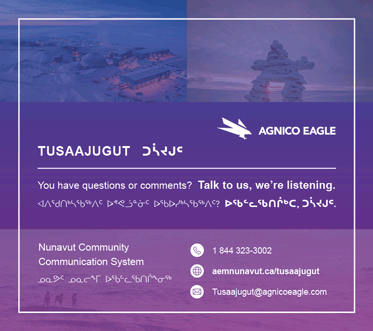Iqaluit drop-in centre offering expanded services in new space
“We give people something productive to do and the tools to do that. And you can just see their self-esteem growing.”
Tukisigiarvik’s program co-ordinator, Elisapi Aningmiuq (left) and staff member Meena Alooloo reveal the inside of one the mini tents the centre is making for daycares across Nunavut. (Photo by Thomas Rohner)
When you walk into Tukisigiarvik’s new space in Iqaluit’s Anglican Parish Hall, the comforting smell of coffee and the low murmur of conversation greet you.
A small group, mostly Inuit men, sit on couches and chairs, some eating bannock. Behind a partition wall, women work on miniaturized tents at sewing machines.
It wasn’t that long ago that the future of Tukisigiarvik, a drop-in centre with services and programming for some of the community’s most vulnerable and marginalized members, looked uncertain. They had lost their bid to keep their building, now bulldozed and replaced by a four-storey hotel.
But today, in their current location since August 2018, the centre is a hub of activity.
“It was a blessing in disguise,” Elisapi Aningmiuq, Tukisigiarvik’s program co-ordinator, told Nunatsiaq News. “We have so much more space now.”
One of their biggest current projects is a contract with Nunavut’s Education Department. Staff and clients have been busy making miniaturized kakivaks, or fish spears, sealskin drying racks, tents and other tools.
Soon, children in daycares across Nunavut will have these miniaturized tools in their classrooms to learn about traditional Inuit lifestyles and skills.
“For a lot of our clients, this place is about self-esteem, feeling better about themselves and learning where they came from and what their ancestors did,” Aningmiuq said.
Tukisigiarvik, which means “a place to find understanding” in Inuktitut, is now in its 18th year of operation.
Their core drop-in programs include breakfast with fresh bannock and same-day counselling appointments. In the afternoons, crafters and seamstresses drop in to work on their own projects or get patterns for things like parkas, kamiks and mittens.
Since opening its doors in 2003, the centre has had more than 5,000 people drop in for more than 96,000 sessions, according to Tukisigiarvik’s most recent annual report.
During that time, the centre says it has spent more than $8.3 million on staff wages and honoraria in Iqaluit, paid $3.7 million for goods and services from local businesses and put $12.7-million into the local economy.
“We buy everything we can from local businesses, based in Iqaluit. We get country food from hunters and trappers. The only thing we have to buy from outside is our insurance,” said David Wilman, executive director of Tukisigiarvik.
Wilman oversaw the centre’s transition to its new, bigger location.
Thanks to funding from the City of Iqaluit, the centre poured $59,000 into renovations at the Anglican Parish Hall in the first three months after the move, Wilman said.
And renovations are ongoing.
Tukisigiarvik is in talks with the Department of Community and Government Services to reconfigure the space, said Wilman.
The plan is to separate the drop-in breakfast area from the project area and from private rooms for counselling.
That way, programs, such as the eight-week full-time life skills program that earns clients Arctic College credits, would have their own dedicated space, Wilman said.
And new programs and services are in the works with a new and improved space, he added.
That includes the Strengthening Family program, which aims to improve communication in Inuit families across generations, and new shower facilities that are being installed for the homeless to use.
But Tukisigiarvik has a bit of an uphill battle with funding at the moment.
An annual $500,000 contribution from Public Safety Canada is in its fifth and final year, Wilman said.
The centre may have to lay off some of its 65 part-time staff, he added.
But Wilman said he has a number of leads on other potential funding.
And in the meantime, Tukisigiarvik continues to receive strong support from funders like the federal government, the Government of Nunavut and the City of Iqaluit.
In fact, Tukisigiarvik’s model is so successful that other community groups in Nunavut regularly ask for their help on any number of things, including funding proposals.
“I think we’ve become a role model for something that every Nunavut community should have,” Elisapi Aningmiuq said.
Wilman said the centre’s core philosophy is Illiqqusittigut Makigiarniq, which means “through our culture gaining strength.”
“We give people something productive to do and the tools to do that. And you can just see their self-esteem growing. We have a very high interest in our programs,” Wilman said.






(0) Comments